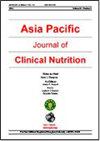饭后血糖反应、胰岛素反应和认知的日差异。
IF 1.3
4区 医学
Q4 NUTRITION & DIETETICS
Asia Pacific journal of clinical nutrition
Pub Date : 2022-03-01
DOI:10.6133/apjcn.202203_31(1).0007
引用次数: 1
摘要
背景和目的昼夜节律引起的白米饭血糖反应的变化已被广泛研究,但仍存在争议。这项研究调查了米粉对血糖反应、胰岛素反应、饱腹感和急性认知功能影响的昼夜差异。方法和研究设计第1组共20名健康参与者和第2组共14名健康参与者在上午8:00(早餐米饭)、下午12:30(午餐米饭)和下午5:00(早晚餐米饭)随机食用相同份量的含有50g可用碳水化合物的熟白米。对每顿测试餐进行餐后血糖、胰岛素、饱腹感和认知能力测试。结果:早晚餐时吃米饭比午餐时吃米饭引起的血糖反应明显温和,并导致胰岛素敏感性比早餐时吃米饭低。在饥饿感和预期食物摄入量方面,试验餐之间没有观察到差异。不同膳食的日间急性认知表现没有显著差异。相关分析表明,低血糖反应的低变异性与较高的认知能力呈正相关。结论下午5:00的高血糖指数白米晚餐可能有助于日常血糖管理。本文章由计算机程序翻译,如有差异,请以英文原文为准。
Diurnal differences in glycemic responses, insulin responses and cognition after rice-based meals.
BACKGROUND AND OBJECTIVES
The variation in glycemic responses to white rice caused by the circadian rhythm has been widely investigated but remain controversial. This study investigated diurnal differences in the effect of rice meals on glycemic responses, insulin responses, satiety, and acute cognitive function.
METHODS AND STUDY DESIGN
A total of 20 healthy participants in Group 1 and 14 in Group 2 were served identical servings of cooked white rice containing 50 g of available carbohydrates at 8:00 a.m. (rice at breakfast), 12:30 p.m. (rice at lunch), and 5:00 p.m. (rice at early supper) in a randomized order. Postprandial blood glucose, insulin, satiety, and cognitive performance tests were conducted for each test meal.
RESULTS
The rice at an early supper elicited significantly milder glycemic responses than did the rice at lunch and resulted in a lower insulin sensitivity than did rice at breakfast. No difference was observed among the test meals in terms of hunger and prospective food intake. Diurnal acute cognitive performance did not differ considerably among the meals. A correlation analysis indicated that low variability in glycemic responses was positively associated with superior cognitive performance.
CONCLUSIONS
A high-glycemic index white rice supper at 5:00 p.m. may facilitate daily glycemic management.
求助全文
通过发布文献求助,成功后即可免费获取论文全文。
去求助
来源期刊
CiteScore
2.50
自引率
7.70%
发文量
58
审稿时长
6-12 weeks
期刊介绍:
The aims of the Asia Pacific Journal of Clinical Nutrition
(APJCN) are to publish high quality clinical nutrition relevant research findings which can build the capacity of
clinical nutritionists in the region and enhance the practice of human nutrition and related disciplines for health
promotion and disease prevention. APJCN will publish
original research reports, reviews, short communications
and case reports. News, book reviews and other items will
also be included. The acceptance criteria for all papers are
the quality and originality of the research and its significance to our readership. Except where otherwise stated,
manuscripts are peer-reviewed by at least two anonymous
reviewers and the Editor. The Editorial Board reserves the
right to refuse any material for publication and advises
that authors should retain copies of submitted manuscripts
and correspondence as material cannot be returned. Final
acceptance or rejection rests with the Editorial Board

 求助内容:
求助内容: 应助结果提醒方式:
应助结果提醒方式:


